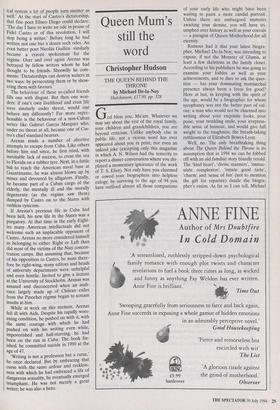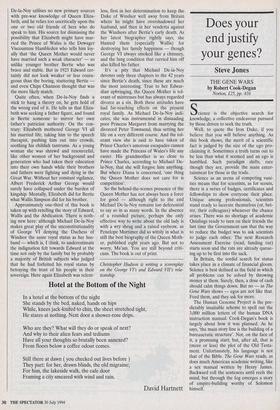Queen Mum's still the word
Christopher Hudson
THE QUEEN BEHIND THE THRONE by Michael De-la-Noy Hutchinson, £17.99, pp. 328 God bless you, Ma'am. Whatever we may say about the rest of the royal family, your children and grandchildren, you are beyond criticism. Unlike anybody else in public life, not a vicious word has ever appeared about you in print, nor even an unkind joke (excepting only this magazine in which A. N. Wilson had the temerity to report a dinner conversation where you dis- played a momentary ignorance of the work of T. S. Eliot). Not only have you charmed or cowed your biographers into helpless eulogy; by surviving to the age of 94 you have outlived almost all those companions of your early life who might have been waiting to paint a more candid portrait. Unless there are embargoed memoirs awaiting your demise, you will have tri- umphed over history as well as your coevals — a paragon of Queen Motherhood for all eternity.
Rumour had it that your latest biogra- pher, Michael De-la-Noy, was intending to expose, if not the Monster of Glamis, at least a few skeletons in the family closet. According to his publishers he was going to examine your foibles as well as your achievements, and to dare to ask the ques- tion — has your dominating matriarchal presence always been a force for good? Here at last, in keeping with the spirit of the age, would be a biographer for whom sycophancy was not the better part of val- our: a man who would not be charmed into writing about your exquisite looks, your poise, your twinkling smile, your irrepress- ible sense of humour, and would give full weight to the toughness, the breath-taking ruthlessness of Elizabeth Bowes-Lyon.
Well, no. The only breathtaking thing about The Queen Behind the Throne is its assumption that in 1994 we can be fobbed off with an old familiar story blandly retold. The 'kind heart', 'divine manners', 'immac- ulate complexion', 'innate good taste', `charm' and 'sense of fun' (not to mention the gift for repartee) dazzle the biogra- pher's vision. As far as I can tell, Michael De-la-Noy utilises no new primary sources with pre-war knowledge of Queen Eliza- beth, and he relies too uncritically upon the one or two old friends of hers who do speak to him. His source for dismissing the possibility that Elizabeth might have mar- ried the Prince of Wales is the Dowager Viscountess Hambleden who tells him loy- ally that 'the Queen Mother would never have married such a weak character' — so unlike younger brother Bertie who was brave and stable. But in 1923 Edward cer- tainly did not look weaker or less coura- geous than the boring, stuttering Bertie and even Chips Channon thought that was the more likely match.
Quite often, when De-la-Noy finds a stick to hang a theory on, he gets hold of the wrong end of it. He tells us that Eliza- beth was seeking a father figure, and found in Bertie someone to mirror her own father's patrician authority. On the con- trary: Elizabeth mothered George VI all his married life, taking him to the speech therapist, pushing him out into crowds, soothing his childish tantrums. As a young woman she was shrewd and resourceful, like other women of her background and generation who had taken their education into their own hands while their brothers and fathers were fighting and dying in the Great War. Without her constant vigilance, Albert Frederick Arthur George would surely have collapsed under the burden of kingship. Mentally, Elizabeth did for Bertie what Wallis Simpson did for his brother.
Approximately one-third of this book is taken up with retelling the story of Edward, Wallis and the Abdication. There is noth- ing new here: although Michael De-la-Noy makes great play of the unconstitutionality of George VI denying the Duchess of Windsor the same royal status as her hus- band — which is, I think, to underestimate the indignation felt towards Edward at the time not only by the family but by probably a majority of British subjects who judged that he had forfeited his royal status by betraying the trust of his people in their sovereign. Here again Elizabeth was relent- less, first in her determination to keep the Duke of Windsor well away from Britain where he might have overshadowed her husband, and then in her vendetta against the Windsors after Bertie's early death. As her latest biographer rightly says, she blamed them (especially Wallis) for destroying her family happiness — though George VI always smoked like a chimney, and the lung condition that carried him off also killed his father.
It's a pity that Michael De-la-Noy devotes only three chapters to the 42 years since Bertie's death, since these are much the most interesting. True to her Edwar- dian upbringing, the Queen Mother is tol- erant of mistresses but has always regarded divorce as a sin. Both these attitudes have had far-reaching effects on the present royal family. As Michael De-la-Noy indi- cates, she was instrumental in dissuading poor Princess Margaret from marrying the divorced Peter Townsend, thus setting her life on a very different course. And the tol- erant view she is said to have taken of Prince Charles's amorous escapades cannot have made the Princess of Wales's life any easier. His grandmother is so close to Prince Charles, according to Michael De- la-Noy, that she will forgive him anything. But where Diana is concerned, 'one thing the Queen Mother does not care for is competition'.
So the behind-the-scenes presence of the Queen Mother has not always been a force for good — although right to the end Michael De-la-Noy remains too deferential to say so in as many words. In the absence of a rounded picture, perhaps the only effective way to write about the old lady is with a wry shrug and a raised eyebrow, as Penelope Mortimer did so wittily in what is still the best biography of the Queen Moth- er, published eight years ago. But not to worry, Ma'am. You are still beyond criti- cism. The book is out of print.
Christopher Hudson is writing a screenplay on the George VI's and Edward VII's rela- tionship.



















































 Previous page
Previous page